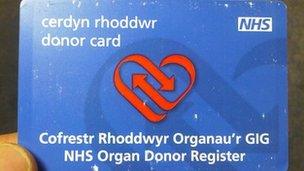Organ donation opt-out backed by two thirds in BBC poll
- Published

Sixty-seven per cent of women and 59% of men favoured presumed consent
Plans to introduce opt-out organ donation are supported by almost two-thirds of Welsh people, according to a BBC Wales poll.
It found 63% of voters backed a system of presumed consent and 31% were against.
Kidney Wales Foundation said people saw it was "important to save lives".
The Welsh government wants to change the law so everyone's organs are available for donation when they die unless they object.
The poll also found strong backing for Wales' 5p charge on shopping bags.
A total of 64% told pollsters ICM it was the right amount to pay for single-use shopping bags - 34% wanted the charge scrapped.
It was introduced last October to discourage people from using disposable bags. The money raised is intended for good causes.
But opinion was split on the performance of Wales' education system.
A fifth (21%) thought the quality of education had got better in the last five years, 35% thought it had stayed the same and 28% thought it had got worse.
Standards
In 2010 Education Minister Leighton Andrews complained of "systemic failure" after Wales slid down international rankings for the education standards of teenagers.
Owen Hathway, of the NUT Cymru teaching union, acknowledged there were challenges for the sector, but said "negative headlines" had shaped people's perceptions of what was happening in the classroom.
"I think what we've seen over the last few years in particular is almost an offensive PR campaign that's been quite negative towards the profession and quite negative towards education in general," he said.
"So with that in mind it's probably no shock that some people see that standards have gone down."
The findings on organ donation come as the Welsh government weighs up responses to a consultation on changing the law in favour of presumed consent.
Brain dead patients
Sixty seven per cent of women were in favour, compared to 59% of men, the poll found.
A bill is expected this year, paving the way for what would be the first system of its kind in the UK.
Campaigners argue an opt-out system would increase the number of organs available for transplant.
Currently, people wishing to donate their organs must first sign up to the organ donor register.
Under new proposals for presumed consent, it would be assumed automatically that everyone has agreed to organ donation, unless they have previously opted out.
Last month, the British Medical Association called for fresh debate in the UK on organ donation to keep up with the demand for organs for transplant.
It said new types of donors may need to be considered, like brain dead patients kept alive on ventilators.
Power questioned
The Archbishop of Wales, Dr Barry Morgan, has already called for the legislation to be scrapped and has questioned whether the planned legislation was a legitimate use of power by the Welsh government.
Commenting on the poll result, Roy Thomas, of Kidney Wales Foundation, said: "People are seeing that it's important to save lives, that's the clear message, that's the end game.
"Those that opposed that, they don't see that end game. The people who are in favour see that it does make a difference."
But Ivo Dawnay, who had a liver transplant after he was diagnosed with Hepatitis C and cirrhosis of the liver in 1995, told Radio Wales why he is against a law that presumes consent for organ donation.
'Nationalising bodies'
He said: "I do think there's a huge danger that we are, in effect, nationalising the bodies of the Welsh nation.
"What about the 31% of responders who really don't want presumed consent? Are we saying that a majority of the people in Wales want to introduce presumed consent, therefore everybody else has got to fall in to line?
"There has to be a degree of gift in organ donation. People have to own their own bodies even after they're dead. It isn't just philosophical, it's practical as well. You could have fantastic legal battles over these issues."
ICM questioned 1,000 adults in Wales between 24 and 26 February.
- Published1 March 2012
- Published31 January 2012
- Published23 January 2012
- Published18 September 2011